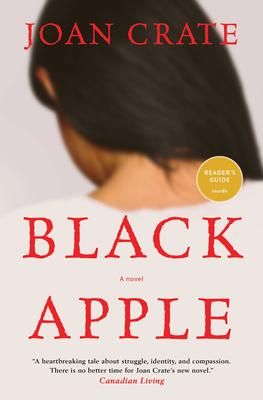

 Canadian Read
Canadian ReadPublish Date |
May 30, 2017 |
Category |
Fiction / Indigenous Fiction / Coming of Age |
Price |
$19.99 |
ISBN: 9781476795171
Format: Paperback
Pages: 336
Publisher: Simon & Schuster
Published: May 30, 2017
“Black Apple describes life in a prairie residential school in the 1940s and 50s, in all its heartbreaking complexity. It is a compelling and powerful novel, with beautifully rendered characters, and a lyricism that speaks to Joan Crate’s background as a poet. An extraordinary achievement.”“Clean, tough and tender. Near the end of the residential school system in Canada, Rose Marie enters St. Mark’s and her journey is like a raven, ragged in the wind but flying strong.”“Black Apple is an achievement, a novel that examines the complexities of the residential school system from the point of view of women, including a young girl who is ripped from her family and an aging Catholic nun who has seen it all. This story of girls, women and the system that controls them grips from the very first pages.”“Joan Crate takes a compelling and clear-eyed look at this history, setting her coming-of-age tale at a fictionalized institution in the Prairies during the 1940s and ‘50s. . . . Crate doesn’t shrink from the abuses of the residential school system, but she extends her curiosity to both the victims and the perpetrators.”“Authentic and respectful. . . . The legacy of the residential school and how it separated child from parent is inescapable. As Crate says, it ‘felt like a domineering character.’”“A heartbreaking tale about struggle, identity and compassion.”“Joan Crate has written a story that will capture reader’s hearts within the first chapter. . . . Black Apple is an emotional powerhouse. Crate’s poetic style of writing adds uniqueness and beauty into a story that is full of repression, loss and the aftermath of these girls who come out of St. Mark’s with no real sense of self. . . . Black Apple joins the continuing effort to break the silence of Canada’s residential schools and bring the truth to light. This may be just a work of fiction, but the story inside is a must read for all of Canada.”“Joan Crate’s story of a Blackfoot girl’s childhood and adolescence spent at a residential school is a strong addition to the body of literature that grows in the wake of this shameful history. . . . Crate’s use of nature imagery to create Rose’s internal world showcases her poetic talent and effectively delineates the divide between Rose’s cultural values and those of the western European world into which she’s been swallowed. . . . Black Apple has an important place on the shelf… demonstrating the cathartic power of literature to teach, reflect and possibly heal.”“Crate… effectively evokes the emotional trauma of [a] young girl’s separation from her mother, father, and younger brother, as well as the harrowing disorientation of her life at St. Mark’s. . . . . Black Apple [is] both timely and welcome.”“Crate’s beginnings as a poet are in evidence as she invokes the cold Prairie winters… and the strict, sterile environment of the school. . . . Black Apple should certainly spur discussion. And that, for a society still struggling to come to terms with a shared and troubled history, is its gift.”“Her beautiful writing reflects her love for the landscape and people. . . . VERDICT: Give to teens interested in social injustice and tales about indigenous people.”